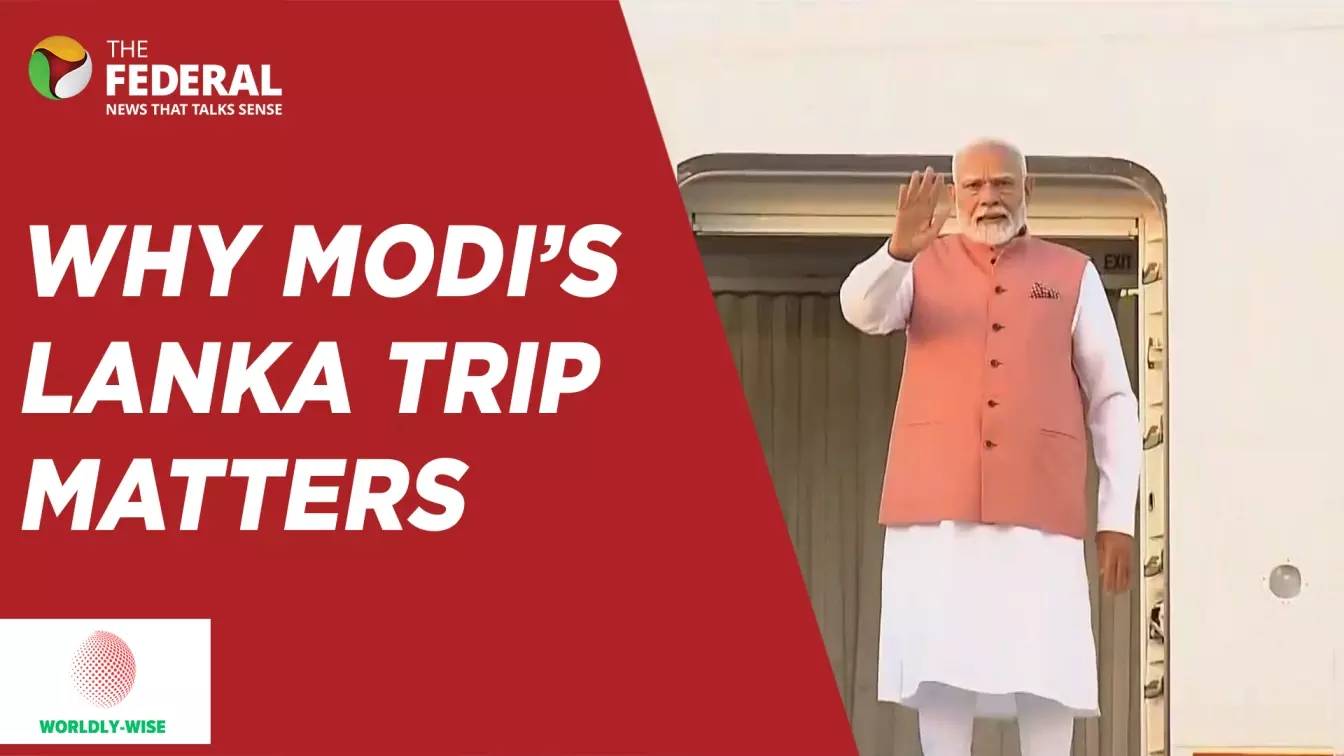
PM Modi’s Sri Lanka visit: Can it reset ties and contain China?
With a changing Sri Lankan political landscape, growing Chinese influence, and evolving Tamil concerns, the visit offers both opportunity and challenge

Prime Minister Narendra Modi’s upcoming visit to Sri Lanka from April 4 to 6 is being seen as a significant diplomatic outreach amid fluctuating relations between the two neighbours. In this episode of Worldly Wise, The Federal’s Managing Editor K S Dakshina Murthy speaks to veteran journalist M R Narayan Swamy to explore the implications of this trip, India’s strategic interests, and the evolving political dynamics in Sri Lanka.
Diplomatic reset
According to Narayan Swamy, the Modi visit could help reset India-Sri Lanka ties at a time when regional equations are rapidly changing. He said, "This visit will play a hugely important role in stabilising and probably further cementing the relationship."
Also read: India, Sri Lanka to sign defence pact during Modi visit amid growing Chinese clout
With India's neighbours in turmoil and diplomatic goodwill in short supply, Sri Lanka remains one of the few countries with which India can still negotiate mutual interests. Narayan Swamy points out that the new government in Colombo has shown maturity in recognising Indian strategic sensitivities.
China's growing presence
Narayan Swamy emphasised the shifting regional dynamics, highlighting China's deepening relationship with Sri Lanka. "China has been a very old and reliable friend of Sri Lanka since the 1960s," he noted. This was especially visible during the final stages of the civil war in 2008-2009, when China and Pakistan supplied weapons as India and Western countries refrained.
Also read: TN fishermen, China could be Modi’s top priorities during Sri Lanka visit
Despite India's past hesitations, Narayan Swamy believes the current Sri Lankan administration understands the need to not pit China against India. "They should be very conscious of India's strategic concerns," he said, adding that Colombo's cooperation in this regard is likely during Modi's visit.
Impact of India's aid
India's timely support during Sri Lanka's 2022 economic crisis has not gone unnoticed. Narayan Swamy noted, "India played a really good role during the economic crisis. It helped a lot of people look at India more positively."
Also read: Ground report: Economic crisis eases but inflation still bites Sri Lankans
He also remarked on the surprising evolution of the Janatha Vimukthi Peramuna (JVP), historically anti-India, which is now signalling openness to stronger ties with New Delhi. This, Narayan Swamy argued, reflects both changing times and effective Indian diplomacy.
Defence pact concerns
One contentious point is the proposed India-Sri Lanka defence pact, the details of which remain undisclosed. Narayan Swamy explained that despite a longstanding defence relationship, formalising it raises domestic concerns within Sri Lanka. "If government A does a pact, opposition B opposes it. When roles reverse, the same cycle continues," he said.
Fears over the pact affecting Sri Lanka's ties with China persist, though Narayan Swamy believes the onus is on the Sri Lankan government to explain the agreement's benefits without escalating tensions.
Tamil question remains sensitive
The Tamil issue continues to influence India-Sri Lanka relations, especially with Tamil Nadu's political sensitivities. However, Narayan Swamy asserted that megaphone diplomacy has failed. "India needs to do things quietly. It didn't help the Tamils either when India publicly dictated terms."
He observed that Sri Lankan Tamil politics has also evolved, especially after the LTTE's collapse. He stressed that India should remain engaged but through more nuanced and quieter methods.
Tamil Nadu politics
Narayan Swamy downplayed the impact of Sri Lanka policy on electoral politics in Tamil Nadu. He said, "Sri Lanka will not be the dominant factor in any election in Tamil Nadu. The LTTE no longer exists, and Tamil politics has changed."
He added that the BJP or any Central government would be wise to balance its messaging and policies to avoid alienating the Tamil constituency.
Fishermen conflict
A persistent point of friction is the fishermen issue, which Narayan Swamy called "a conflict between two Tamil communities." He said Indian trawlers often intrude into Sri Lankan waters, impacting the livelihoods of local Tamil fishermen.
"The Sri Lankan fishermen want their government to protect them. They say, 'Do our people get arrested in India? No. Because we don't intrude,'" he explained, highlighting that the Indian government will eventually have to step in to mediate.
Projects and symbolism
Modi’s visit will also include a major solar power project inauguration in Sampur, replacing an earlier coal plan. More symbolically, the Prime Minister is also visiting Anuradhapura, a sacred Buddhist city, marking an outreach to Sri Lanka’s Buddhist majority.
Narayan Swamy compared it to a foreign leader visiting Ayodhya. "It has a huge significance for Sri Lankan Buddhists. It helps balance India’s perceived tilt towards Tamils."
As Modi prepares for his visit, the India-Sri Lanka relationship sits at a complex intersection of history, regional strategy, and domestic politics. With a changing Sri Lankan political landscape, growing Chinese influence, and evolving Tamil concerns, the visit offers both opportunity and challenge.
(The content above has been generated using a fine-tuned AI model. To ensure accuracy, quality, and editorial integrity, we employ a Human-In-The-Loop (HITL) process. While AI assists in creating the initial draft, our experienced editorial team carefully reviews, edits, and refines the content before publication. At The Federal, we combine the efficiency of AI with the expertise of human editors to deliver reliable and insightful journalism.)

